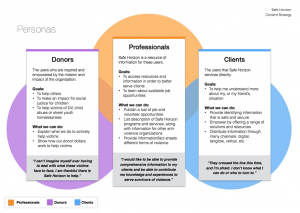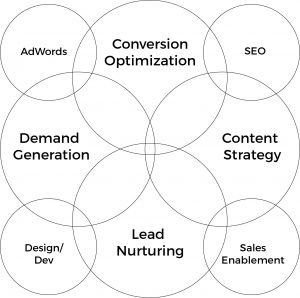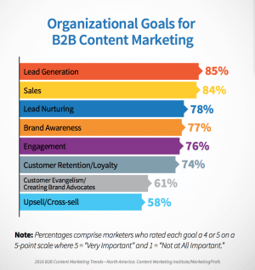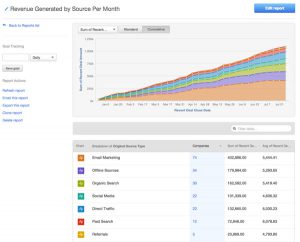
B2B Articles - May 22, 2017
 Sometimes, your B2B marketing campaign won’t “work.” Your traffic or lead goals fall short, your team gets stressed, or you just don’t complete the pieces on time.
Sometimes, your B2B marketing campaign won’t “work.” Your traffic or lead goals fall short, your team gets stressed, or you just don’t complete the pieces on time.
While many factors can affect your campaign during execution, oftentimes, you can pinpoint the failure back to some shortcomings in your marketing team.
Just 61% of marketers believe their marketing strategy is effective.
But realizing you have a team pain point is the first step to solving it. Here are five reasons why teams can fail and the red flags to look out for if managing a team — then how to solve them.
Buyers are 48% more likely to consider solution providers that personalize their marketing to address their specific business issues.
If marketers fail to define their persona’s pain points accurately, then the campaign will be off to a rocky start. Each marketing campaign should revolve around solving an underlying need for the target market — a pain that is real, measurable, and solvable. If marketers don't address a particular problem of the persona, then the persona will not form a connection to the brand.
So without a pain point identified, the campaign may fall on deaf ears. This could lead to low traffic and even lower conversions on campaign materials.
 It's helpful to identify your top personas and write out their needs — and your proposed marketing and content solutions — in a visual way that your whole team can reference to stay on topic.
It's helpful to identify your top personas and write out their needs — and your proposed marketing and content solutions — in a visual way that your whole team can reference to stay on topic.
Before starting a campaign, your marketing team should conduct research to understand buyers in real, not assumed, ways. That means interviewing customers, reading research papers, and following buyers on social networks to get a sense of their goals and challenges.
Then, solving these problems must be the core focus of the campaign. And the solution will drive all the messaging, ad copy, calls-to-action, and follow-up emails.
But if your team has already identified a problem but still isn't seeing traction, you may need to reframe the problem or your solution. Go back to the drawing board and be more thorough about buyer persona research, pain points, and buyer needs. Collecting this information can better frame the marketing strategy and give the campaign more chance of B2B lead generation.
Having a failed campaign under one’s belt provides deep learning lessons. Many young marketers may not have seen firsthand what it’s like to fail. Without knowing what doesn’t work, marketers can fall trap to launching campaigns that have failed in the past. Agencies, at times, can put too many novice marketers on a certain client, especially if there are not enough senior people to go around.
 Put data at the forefront of these discussions. Use data to drive better decision-making because it trumps any arguments that are opinion-based or anecdotal.
Put data at the forefront of these discussions. Use data to drive better decision-making because it trumps any arguments that are opinion-based or anecdotal.
First and foremost, if there are not enough senior team members, then consider contracting outside help. There are many freelance senior marketers who can come on a campaign to help guide inexperienced team members. Freelancers can give a fresh view of the campaign, bringing outside experience to the team. They can also mentor younger marketers, improving their skills.
Second, it’s vital to talk about failures regularly.
All marketing teams have experienced failure at some point, so hone in on these experiences and discuss them as a team. Use data as a driving force.
Use role-playing or strategy, combined with creative brainstorming sessions, to build the team’s experience. Discuss past failures and highlight learnings and takeaways. Then create smaller pilot campaigns that provide actionable data that can be used to iterate and improve upon.
A successful B2B marketing campaign has many components. From strong SEO to robust analytics, each piece must fit together. Creating a marketing team that encompasses all of those skills is difficult. Many times if a campaign fails, it’s because one piece of the puzzle is missing. And now that data-driven marketing campaigns are proving successful, teams need a marketer with some data science skills — a tough order to fill.
 Here are key areas that marketing teams should be skilled in, in order to be successful. Identify which areas are struggling with your team, then hold workshops or sponsor certifications to improve them.
Here are key areas that marketing teams should be skilled in, in order to be successful. Identify which areas are struggling with your team, then hold workshops or sponsor certifications to improve them.
Marketing skills change constantly, so teams should have professional development opportunities in place. Individuals should be encouraged to take courses or seminars to learn useful skills that can improve campaigns. Hubspot and Google provide certified training for team members, so this should be a top priority company-wide.
Contracting a data scientist or SEO specialist is another option. If a campaign lacks a data specialist, then freelance a person who can read and analyze campaign data to make insightful recommendations for the team.
A marketing campaign starts with a plan, and that plan must include goals.
50% of companies are using digital marketing, but they don't have a plan.

Goals that are not tied to data or that are undefined make measuring the campaign impossible. Especially when reporting to a client or executive, campaigns cannot be considered a success unless they meet specific and relative goals.
Smart goals are as follows:
For example: Within one month, I will increase my client’s website referral traffic by 5%. Goals such as increased traffic over time or increasing Facebook likes are not going to give much information about a campaign.
The team must learn the value of SMART goals and, together, identify which can be implemented on a short-term basis. It’s important to clearly document the goals and discuss them regularly so SMART goals become a habit.
Metrics are critical to any campaign.
Unfortunately, in a study, 62% of companies did not agree with the statement ‘we have the analysts we need to make sense of our data.'
Without analytics, it’s near impossible to understand what works and what doesn’t with a specific audience. Your team must constantly adapt a B2B marketing campaign based on data, so without that information, failure is likely.
 For the highest chance of proving ROI, measure metrics on goals that revolve around lead generation and conversion — not "vanity metrics" like bounce rate, time on page, social shares, etc.
For the highest chance of proving ROI, measure metrics on goals that revolve around lead generation and conversion — not "vanity metrics" like bounce rate, time on page, social shares, etc.
Identify a small set of important metrics that tie to business objectives. Then, identify the right marketing technology to best measure those data points.
For example, a B2B enterprise that wants to build a better sales pipeline can use HubSpot's Marketing Software to measure leads per month, lead source attribution, and conversion rates for campaigns or channels. These metrics will help guide decision-making and track success clearly.
Marketing teams fail when any of the above five shortcomings are present.
Since 80% of marketers report their lead generation efforts are only slightly or somewhat effective, it’s time to look at what can be changed within the team to make it stronger.
A team that works well together, unfortunately, is not enough. Fortunately, with the abundance of technology, marketers can improve campaigns and success rates. So for any team that has had a failed campaign, it’s time to look internally to improve team structure.
Tel 212-993-7809
Ironpaper ®
10 East 33rd Street
6th Floor
New York, NY 10016
Map
First-party data marketing
SEO for B2B
Customer journey strategy
ABM Agency
Marketing for IoT Companies
HubSpot Implementation
B2B Product Marketing
Measurable Marketing
IoT go-to-market strategy
IT Marketing
HubSpot for ABM
Go to market strategy
Technology Marketing
Marketing for IT Companies
ABM Campaigns
B2B lead generation
B2B Marketing and Growth Agency.
Grow your B2B business boldly. Ironpaper is a B2B marketing agency. We build growth engines for marketing and sales success. We power demand generation campaigns, ABM programs, create B2B content, strengthen sales enablement, generate qualified leads, and improve B2B marketing efforts.